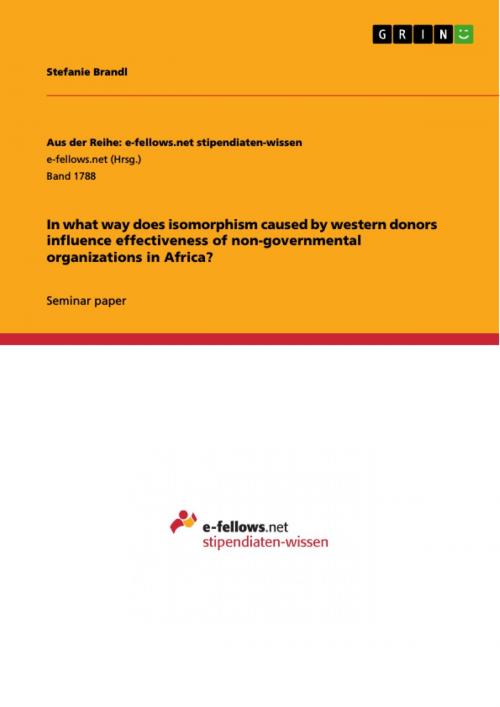In what way does isomorphism caused by western donors influence effectiveness of non-governmental organizations in Africa?
Nonfiction, Social & Cultural Studies, Political Science, International, International Relations| Author: | Stefanie Brandl | ISBN: | 9783668215566 |
| Publisher: | GRIN Verlag | Publication: | May 11, 2016 |
| Imprint: | GRIN Verlag | Language: | English |
| Author: | Stefanie Brandl |
| ISBN: | 9783668215566 |
| Publisher: | GRIN Verlag |
| Publication: | May 11, 2016 |
| Imprint: | GRIN Verlag |
| Language: | English |
Seminar paper from the year 2015 in the subject Politics - International Politics - Region: Africa, grade: 1,6, Friedrich-Alexander University Erlangen-Nuremberg (Chair for Corporate Sustainability Management), language: English, abstract: This paper examines in what way isomorphism caused by western donors influences the effectiveness of non-governmental organizations in Africa. As about 40% of the population in Sub-Saharan Africa live below the poverty line it is interesting to know if African NGOs work effectively. To answer the above mentioned question first the terms NGO and aid delivery system are clarified in chapter 2.1. Thereon, characteristics of African NGOs will be derived and the term effectiveness will be defined in chapter 2.2 and 2.3 before the institutional theory will be introduced in chapter 3. The focus will lay on the three types of isomorphism as well as on explaining an organizational field. Finally in chapter 4 the theoretical concept of institutional theory and the model to measure effectiveness will be applied to African NGOs. For that institutional theory as well as the conceptualizations of effectiveness, goal attainment, resource acquisition and reputation, are applied to find out the influence of isomorphism on the management, program, environment and partnership domain of NGOs. It is concluded that without donors many NGOs could not exist. Nevertheless NGOs became local managers of foreign aid money, not managers of local African development processes and are too much influenced by donors.
Seminar paper from the year 2015 in the subject Politics - International Politics - Region: Africa, grade: 1,6, Friedrich-Alexander University Erlangen-Nuremberg (Chair for Corporate Sustainability Management), language: English, abstract: This paper examines in what way isomorphism caused by western donors influences the effectiveness of non-governmental organizations in Africa. As about 40% of the population in Sub-Saharan Africa live below the poverty line it is interesting to know if African NGOs work effectively. To answer the above mentioned question first the terms NGO and aid delivery system are clarified in chapter 2.1. Thereon, characteristics of African NGOs will be derived and the term effectiveness will be defined in chapter 2.2 and 2.3 before the institutional theory will be introduced in chapter 3. The focus will lay on the three types of isomorphism as well as on explaining an organizational field. Finally in chapter 4 the theoretical concept of institutional theory and the model to measure effectiveness will be applied to African NGOs. For that institutional theory as well as the conceptualizations of effectiveness, goal attainment, resource acquisition and reputation, are applied to find out the influence of isomorphism on the management, program, environment and partnership domain of NGOs. It is concluded that without donors many NGOs could not exist. Nevertheless NGOs became local managers of foreign aid money, not managers of local African development processes and are too much influenced by donors.















